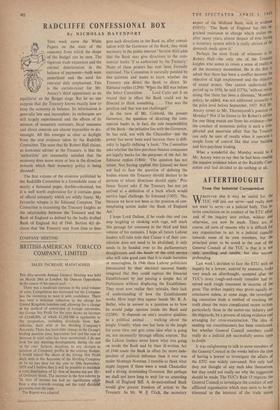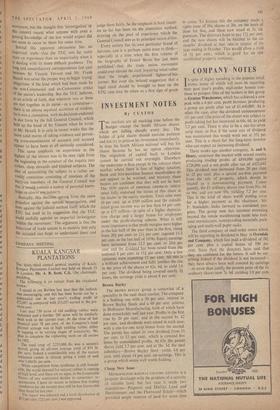AFTERTHOUGHT
From Our Industrial Correspondent
WHATEVER else it may be useful for, the TUC will just not serve—and really does not want to serve—as a judicial body. This in- terim conclusion on its conduct of the ETU affatr and of the inquiry into strikes, wildcat and otherwise, can now be made. There are, of course, all sorts of reasons why it is difficult for any organisation to act in a judicial capacity towards some of its own members, but the principal point to be noted in the case of the General Council of the TUC is that it is not only unwilling and unable, but also uncom- prehending.
Last week's decision to face the ETU with an inquiry by a lawyer, assisted by assessors, looks very much an afterthought, accepted after the TUC's more rough-and-ready remedies had re- ceived such rough treatment in sections of the press. The strikes inquiry may prove equally in- conclusive unless, at some stage, the investigat- ing committee finds a method of reaching the truth about the more complicated recent strikes, particularly those in the motor-car industry and the shipyards, by a process of taking evidence and arranging for cross-examination. The idea of sending out commissioners has been mentioned, but whether General Council members could really do a judicial job successfully seems open to doubt.
It was enlightening to talk to some members of the General Council in the weeks before the idea of having a lawyer to investigate the affairs of the ETU was widely canvassed. Not only had they not thought of any such idea themselves, but they could not really see why the suggestion should be made. The TUC's Rule 13 requires the General Council to investigate the conduct of any affiliated organisation which may seem to be de- trimental to the interests of the trade union
movement, but the thought that 'investigation' in this context meant what anyone with even a passing knowledge of the law would expect did not seem to occur to them for some time.
Behind this apparent obtuseness lies an Important truth—that the TUC sets far more !tore on experience than on impartiality when it Is dealing with its more difficult problems The long and unsatisfactory correspondence last year between Sir Vincent Tewson and Mr. Frank Haxell was never the proper way to begin 'trying' allegations If the kind which had been made by the non-Communist and ex-Communist critics of the union's leadership. But the TUC believes, as an article of faith, that wherever two or three are met together in its name--as a committee— there is an almost mystical accretion of wisdom. So it Was a committee, with its decisions endorsed 10 due form by the full General Council, which held up the hand of Sir Vincent when he wrote tc' Mr. Haxell. It is only in recent weeks that the more solid merits of taking evidence and permit- log cross-examination of accusers and accused appear to have been at all seriously considered.
This same emphasis on experience as the highest of the virtues was to be seen right from the beginning in the conduct of the inquiry into strikes, shop stewards and kindred subjects. The Idea of committing the subject to a rather un- Wieldy committee consisting of nineteen of the thirty-six members of the General Council was that it would contain a 'source of personal know- ledge on almost any industry.
Basically, this decision sprang from the same prejudice against the outside investigation, and even against the judicial method itself, which the ETU has used in its suggestion that the TUC could usefully appoint an impartial investigator within the movement.' The argument is that the behaviour of trade unions is so esoteric that only the initiated can hope to understand them and
judge them fairly. So the emphasis in both inquir- ies so far has been on the committee method, drawing on the pool of experience which the General Council sees as its principal raison d'être.
Every society has its own particular brand of heroism, and it is perhaps naive even to think— especially at a time when the first volume of the biography of Ernest Bevin has just been published—that the trade union movement could ever elevate the cool, inquiring mind rather than the tough, experienced fighter-of-his- corner. But even the belated suggestion that a legal mind should be brought to bear on the ETU case may be taken as a first sign of grace.



































 Previous page
Previous page